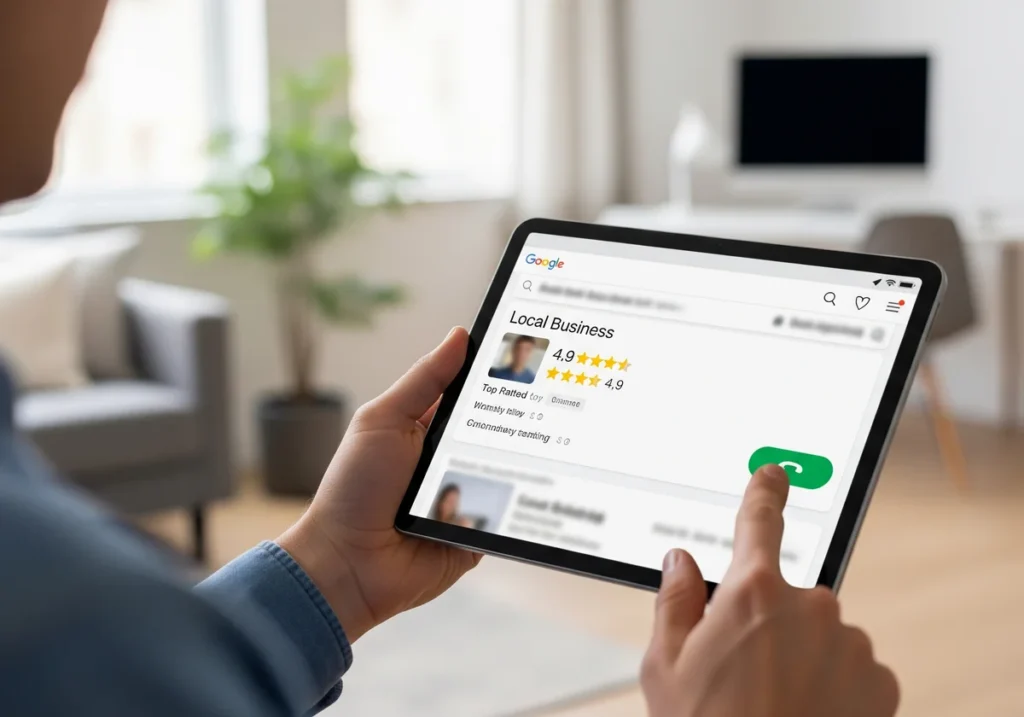Did you know that 83% of customers use Google to find local business reviews? And did you know that Google also uses these reviews as a ranking factor? It’s true. These reviews directly improve your search engine visibility and increase traffic to your site.
Still, most businesses treat reviews solely as a reputation tool.
In this article, we’ll explain how reviews impact your search engine rankings. We’ll also share how to collect authentic reviews, respond properly, and use them to your advantage across multiple platforms.
Ready to learn how customer voices can increase your search engine rankings quickly? Let’s begin.
How Feedback Influences Your Google Ranking
Whenever you search on Google, it wants to show you the most trustworthy and helpful businesses. But how does it decide which company is reliable and honest?
Here’s how…
Google depends on customer reviews to make this decision. These reviews tell Google that your business is real, active, and worth recommending to others.
Put simply, search engines treat customer feedback as proof of your business quality. Google looks at what people say in reviews, how often you receive them, and whether they’re mostly positive or not. All these factors help determine where your business appears in local search results.

And here’s the kicker… Google itself confirms that having more reviews and better ratings directly improves your local search position.
We’ll explain two things in this section. First, we’ll examine how the actual words in reviews help your SEO. Then, we’ll look at why your Google Business Profile is the most important place for collecting these valuable review signals.
Understanding the Direct SEO Impact of Reviews
While writing about their experiences, customers typically use the same words that other people type into Google when searching. It makes reviews incredibly valuable for SEO because they contain authentic language that matches real search queries (Google loves when we talk like humans!).
Think about it this way. When someone writes “brilliant Thai restaurant in central Brisbane with quick delivery,” they’re giving Google multiple ranking signals. The algorithm picks up on “Thai restaurant,” “central Brisbane,” and “quick delivery” as proof of what your business offers.
Reviews also show Google that your business is active. Specifically, fresh reviews signal that people still engage with your business. And if you didn’t know, Google always prioritises businesses that show consistent customer activity in local searches.
Most importantly, reviews help Google understand precisely what your business does. Instead of just relying on your business description, Google can see real customers talking about specific services, products, and experiences.
The Role of Your Google Business Profile (GBP)
Your Google Business Profile (GBP) acts as the main platform where reviews directly impact your search visibility. This is where Google looks first when deciding which businesses deserve to appear in the local map pack.
But wait, what’s the local map pack?
In case you aren’t familiar, it’s a group of three local entities that appear at the top of your search results page. Businesses with good reviews, better ratings, and consistent activity beat competitors with weaker review profiles to achieve a place in this exclusive area.
One more thing: Google also pays attention to how recently you’ve received reviews. For instance, recent reviews prove that your business is relevant and continues to satisfy your customers. This ongoing activity signals to Google that you’re worth showing to new searchers.
Not only that, your responses to reviews also influence your rankings. This is because when you reply to customer feedback, you show Google that you actively engage with your community.
Consistent engagements like this can improve your local search visibility and help you climb higher in the results.
A Strategy to Systematically Get Google Reviews
Now that you understand how reviews boost your rankings, you need a plan to collect them regularly. Most people only ask for reviews when they remember to or when something goes wrong. In reality, this hit-and-miss approach wastes countless opportunities to gather valuable feedback.

Let’s get into more detail on the best opportunities to request reviews from your customers. In the latter part, we’ll also share how you can use GBP to collect those reviews.
When to Ask Customers to Leave Reviews
The best time to ask your customers for reviews is always when they feel most satisfied. It might be right after they buy something, when you solve their problem, or after you complete a service they’re happy with. These moments create natural opportunities to collect positive feedback.
In our experience, successful businesses don’t wait for these moments. Instead, they identify possible moments ahead of time and train their teams to ask for reviews properly.
The most effective times to collect reviews include:
- Post-Purchase Confirmation: People feel good after making a purchase they wanted, so they’re often willing to share their positive experience. That’s why you should ask for reviews on your “thank you” page or in confirmation emails that customers receive after buying.
- After Successful Support: You can send a simple review request after you resolve a customer’s problem or answer their question. It’s a good time because when you’ve just helped someone out, they feel grateful enough to want to help you back by leaving a good review.
- Upon Project Completion: For service businesses, ask for feedback when you finish important milestones or complete projects. This way, your customers can see the results of your work, and they feel confident about recommending you to others.
Creating a Direct Link from Your Business Profile
When customers have to search for your business or click through multiple pages, many simply give up and leave without leaving a review. However, if you can make the reviewing process easy for your customers, they’ll be more inclined to post feedback (nobody likes extra steps).
The best thing is that Google has simplified this process with built-in tools that create direct links to your reviews.
Here’s how to set up an easy system to help your customers leave reviews:
- Direct Review Link Generation: Go to your Google Business Profile dashboard and click “Ask for reviews” to get your unique link. This special URL takes customers straight to your review form without any searching or extra clicks.
- QR Code Creation: Don’t forget to use Google’s built-in QR code generator to create scannable codes for your physical locations. Your local customers can then scan the code with their phone and instantly reach your review page.
- Standard Communication Integration: You may add your review link to email signatures, footers, and regular business messages. That’s how every interaction with your customers will become a potential review opportunity.
Once you have these systems working, you’ll start seeing a stable flow of authentic reviews that’ll improve your Google search rankings.
Still, collecting reviews is just the first step. The way you manage and respond to them can have a greater impact on your search engine optimisation success. We’ll talk about them in the upcoming section.
Managing Online Reviews for Local SEO Wins
How you handle negative reviews and how consistently you engage with your community all contribute to stronger local search performance.
It’s time to explore some specific tactics that’ll help you use your reviews as a competitive advantage for your local rankings.

Responding to Negative Reviews Effectively
As a business owner, it’s totally normal to hate negative reviews. But don’t worry. You can convert these challenging moments into opportunities for growth and trust-building. The process involves responding to your negative reviews with accountability.
In other words, when you handle negative feedback well, you’re demonstrating that your business takes problems seriously and works to make things right.
For example, a thoughtful response to negative reviews will show that you’re approachable and willing to improve. Plus, you truly care about your customer satisfaction.
Let’s see what makes negative review responses so powerful for your SEO.
Using Feedback to Update Business Information
The most valuable aspect of negative reviews is how they reveal gaps in your business information or service delivery. Good businesses with an open mind treat these reviews as free consulting reports that point out precisely what needs improvement.
Say your customers are complaining about outdated hours, incorrect addresses, or services that don’t match your description. If you think about it, they’re pointing out specific issues that hurt your local search performance. So you need to correct the mismatched information promptly.
And it’s no secret that Google wants to show accurate, reliable business information. When you fix those problems based on reviews, it naturally signals to the search engine that your profile is active and you maintain it regularly.
Setting Targets to Boost Your Local Ranking
The businesses that dominate local search results didn’t get there by accident, you know. They constantly track their review performance against competitors and adjust their review collection tactics properly.
The systematic approach we just mentioned helps you stay ahead of your competitors who don’t treat reviews with the same respect.
Now, if you’re wondering how many reviews are enough for your business to ensure a good ranking, here’s some information on that below.
How Many Google Reviews Do You Truly Need?
Studies show that businesses need at least 10 to 15 reviews to gain basic trust. But in competitive markets, you’ll need at least 50 reviews.
The best approach here would be to track how many reviews your top competitors have. Then aim to consistently outperform them in both the number and quality of reviews.
Impact on Visibility in Local Search
A steady stream of recent, positive reviews increases your chance of appearing for relevant local queries. It also helps you climb higher in the most sought-after local map pack that we explained earlier.
As a business, if you can maintain a consistent review momentum throughout the year, you’ll significantly outperform the others that collect reviews in occasional bursts. Based on our experience, a habit of regular review collection is important for maintaining your local search visibility.
Use Customer Reviews for Local SEO Success
Customer reviews can improve your local SEO by giving Google the trust signals needed to rank your business higher. When you respond professionally to all reviews, you show everyone that you care about excellent service. Google loves that.
In this article, we’ve covered how reviews influence Google’s ranking decisions, the perfect timing to request customer feedback, and practical tools like direct review links and QR codes. We’ve also explained why responding to all feedback strengthens your local search performance.
At Appsecute, we help Brisbane businesses with local SEO audits and review strategies that deliver measurable results. Contact us today to figure out how we can boost your local search rankings and attract more customers.
